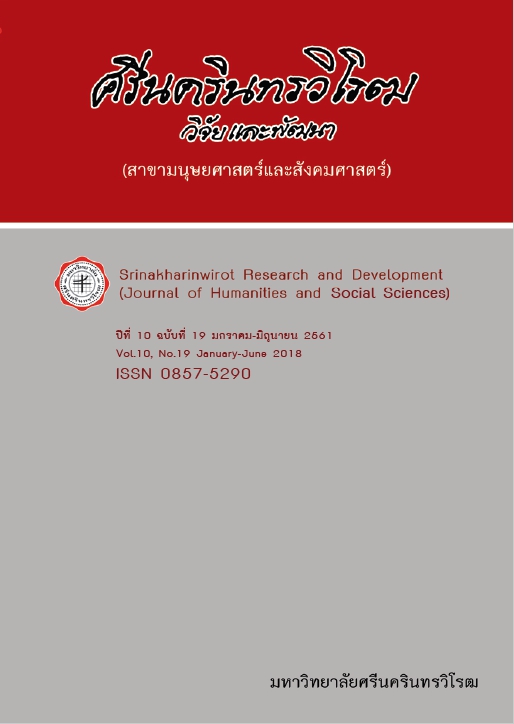ยุทธศาสตร์ความร่วมมือทางการศึกษาที่สะท้อนอัตลักษณ์ของมหาวิทยาลัย: กรณีศึกษา มหาวิทยาลัยเมจิ (STRATEGIES OF ACADEMIC COLLABORATION REFLECTING UNIVERSITY’S IDENTITY: A CASE STUDY OF MEIJI UNIVERSITY)
Keywords:
Strategy, Academic Collaboration, University IdentityAbstract
Currently strategies of academic collaboration apparently play an important role in the education sector as they are one of the more efficient methods for educational institutions to improve quality of education through cooperation as well as exchanging knowledge with either educational institutions or other organizations. Academic collaboration can be promoted in the forms of both bilateral and multilateral, and domestic or international settings. The purposes of this research were to study the principles and approaches by which Meiji University determines the strategies of academic collaboration reflecting the university’s identity and develops the collaboration based on those strategies with overseas universities including Thailand; and to propose appropriate principles and approaches by which Thai universities can determine and develop strategies of academic collaboration which well reflect their own identities. The sample groups of this qualitative research were: 15 Meiji University executives, professors and officers; 8 assistants to the president and officers of international affairs or international relations division from 5 universities in Thailand; 5 academics and educationalists from the Office of the Higher Education Commission and the Office of the Education Council. The research tools consisted of documents and related on-line information, the interview forms for Meiji University’s officers and the in-depth interview forms for Meiji University’s executives, and the questionnaire forms for Thai academics and educationalists. The data were analyzed using percentage and data analysis. The research findings showed that: 1) Overseas universities, Meiji University and Thai universities determine academic collaboration strategies based upon their own institutional identities; that include university philosophy, vision, policy, and educational goals including overall administration. In some cases, government policies are also taken into account; 2) Most universities share the common forms of collaboration activities, which consist of research, student exchanges, faculty and staff exchanges, instructional collaboration and academic services; 3) Universities should promote well-planned and well-grounded academic collaboration strategies based upon university identities. In addition, universities should establish the departments in charge of the collaboration as well as effective ways of brainstorming and work collaboration to determine the most appropriate strategies. Moreover, adequate long-term support from both government and private sectors is also inevitably essential.
Downloads
References
[2] สำนักงานคณะกรรมการการอุดมศึกษา กระทรวงศึกษาธิการ. (2551). กรอบแผนอุดมศึกษาระยะยาว 15 ปี ฉบับที่ 2 (พ.ศ. 2551-2565). สืบค้นเมื่อ 10 ตุลาคม 2557, จาก http://113.53.231.35/ipepb/12/15.pdf
[3] ประดิษฐ์ มีสุข; และ ทรงธรรม ธีระกุล. (2551). วิกฤตคุณภาพบัณฑิตศึกษากับบทบาทมหาวิทยาลัย. ใน หนังสือทักษิณวิชาการ’51 มหาวิทยาลัยทักษิณกับทางแก้วิกฤตของชาติ. หน้า 119-143. สงขลา: มหาวิทยาลัยทักษิณ.
[4] OECD. (2015). Education Policy Outlook: Japan. Paris: OECD Publishing. Retrieved October 20, 2016, from www.oecd.org/education/policyoutlook.htm
[5] ศุภฤกษ์ รักชาติ; และ สุวิมล ว่องวาณิช. (2012). การวิเคราะห์ความต้องการจําเป็นด้านความเข้าใจเกี่ยวกับอัตลักษณ์โรงเรียนและแนวทางการกําหนดอัตลักษณ์โรงเรียนของผู้บริหารสถานศึกษา. วารสารอิเล็กทรอนิกส์ทางการศึกษา. (7): 2271-2285. สืบค้นเมื่อ 20 ตุลาคม 2559, จาก http://www.edu.chula.ac.th/ojed/doc/V71/v71d0166.pdf
[6] Meiji University. (2014). About Meiji University. Retrieved December 2, 2014, from http://www.meiji.ac.jp/cip/english/about/international/index.html
[7] Guangxi University for Nationalities. (2014). About us. Retrieved November 12, 2014, from http://english.gxun.cn/aboutus.html
[8] University of Hohenheim. (2014). Profile. Retrieved November 12, 2014, from https://www.uni-hohenheim.de/1598?&L=1
[9] University of Hawaii at Manoa. (2014). Manoa International Exchange. Retrieved November 12, 2014, from http://manoa.hawaii.edu/mix
[10] The University of Queensland. (2014). University of Queensland Strategic Plan 2014-2017. Retrieved November 12, 2014, from http://www.uq.edu.au/about/docs/strategicplan/StrategicPlan2014.pdf
[11] Chiba University. (2014). About Chiba University. Retrieved November 12, 2014, from http://www.chiba-u.ac.jp/e/about/index.html
[12] Kyushu University. (2014). About Kyushu University. Retrieved November 12, 2014, from http://www.kyushu-u.ac.jp/english/university/index.php
[13] Keio University. (2014). Introduction. Retrieved November 12, 2014, from http://www.keio.ac.jp/en/about_keio/introduction.html
[14] Tokyo University. (2014). About the University of Tokyo. Retrieved November 12, 2014, from http://www.u-tokyo.ac.jp/en/about/index.html
[15] สำนักงานคณะกรรมการการอุดมศึกษา กระทรวงศึกษาธิการ. (2556). ความร่วมมือทางวิชาการระหว่างสถาบันอุดมศึกษาไทยกับสภาบันต่างประเทศ พ.ศ. 2552-2553. สืบค้นเมื่อ 10 ตุลาคม 2557, จาก https://drive.google.com/file/d/0B0tJlz-N98SrcXpPZ1lmWVRSaGc/view?pref=2&pli=1
[16] Meiji University. (2014). Organization for International Collaboration. Retrieved December 2, 2014, from http://www.meiji.ac.jp/cip/english/institute/international.html
Downloads
Published
How to Cite
Issue
Section
License
Srinakharinwirot Research and Development Journal of Humanities and Social Sciences is licensed Under a Creative Commons Attribution-NonCommercial-NoDerivs 4.0 International (CC-BY-NC-ND 4.0) License, Unless Otherwise Stated. Please Read Journal Policies Page for More Information on Open Access, Copyright and Permissions.



